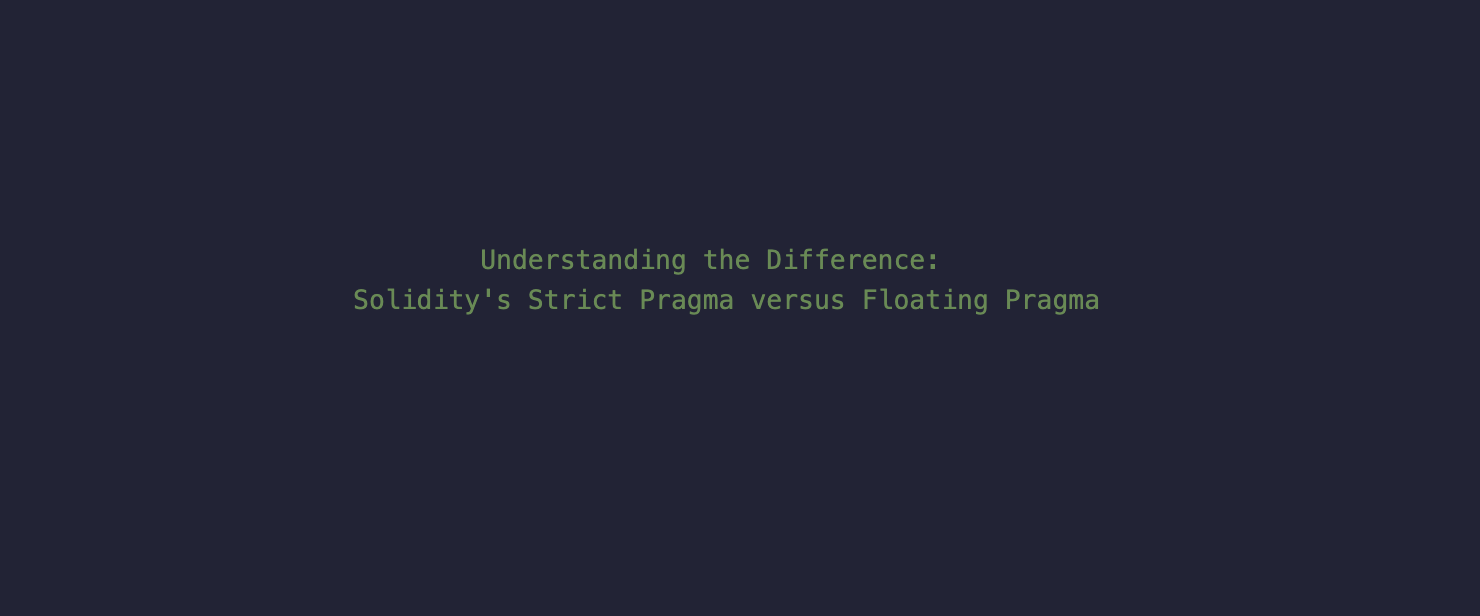Understanding the Difference: Solidity's Strict Pragma versus Floating Pragma
 Aapsi Khaira
Aapsi KhairaTable of contents
- Getting Started
- The Pragma Playbook
- The Two Sides of the Pragma Coin
- Why Strict Reigns Supreme?
- The Dangers Lurking in the Shadows of Floating Pragmas
- Backward Incompatibility: The Silent Saboteur
- Unintentional Adoption of Experimental Features: The Pandora’s Box
- Security Patch Delays: Playing a Dangerous Game of Catch-Up
- The Pragmatic Path Forward
- In Conclusion

Getting Started
In the world of Solidity, where smart contracts reign supreme, the first line of defence against chaos is often the pragma directive. But what’s the fuss between strict and floating pragmas? Let’s dive into the nitty-gritty and uncover why sticking to the rules might just save your smart contracts from a world of trouble.
When it comes to Solidity in Ethereum, using a strict pragma is like sticking to a set plan, while floating pragmas are a bit more like going with the flow.

What is Pragma?
Pragmas are like instructions for the compiler, telling it which version of Solidity to use when compiling your smart contracts.
So, a strict pragma is like saying, “Hey compiler, use version 0.8.25, no ifs, ands, or buts.” On the other hand, a floating pragma might say, “Compiler, anything from version 0.8.0 and up is cool, but no 0.9.0 yet, okay?”
Let’s understand it through an example👇
The Pragma Playbook
Imagine the pragma as the conductor of an orchestra, setting the tempo for the compiler to follow. In Solidity parlance, pragma stands for “Pragmatic Information for Solidity,” and its job is to tell the compiler which version of Solidity it should dance to. But here’s the twist: it doesn’t just affect the music; it ensures harmony between different parts of your codebase.
The Two Sides of the Pragma Coin

Strict Pragma
On one side, we have the strict pragma, standing firm like a sentry at the gate. It says, “This is the version I want, and I won’t settle for anything less.” Picture it like a stubborn old dog, refusing to budge from its favourite spot on the porch.

Floating pragma
On the other side, we encounter the floating pragma, a bit more flexible in its approach. It’s like saying, “I’m open to anything within this range, but don’t push it.” Think of it as a negotiator, willing to compromise but with clear boundaries.
Why Strict Reigns Supreme?
Now, you might wonder, why all the fuss about being strict? Well, imagine your smart contract as a fortress, with bugs and vulnerabilities lurking outside the walls. A strict pragma acts as the gatekeeper, ensuring that only the most trusted version of the compiler can enter.
The Dangers Lurking in the Shadows of Floating Pragmas
But what about floating pragmas, you ask? Ah, tread carefully, my friend, for here lies the path to uncertainty. Floating pragmas might seem enticing, offering a range of options like a buffet spread, but beware the hidden traps.
Backward Incompatibility: The Silent Saboteur
Picture this: you’re cruising along, your code running smoothly, when suddenly, a new compiler version drops like a bombshell. With a floating pragma, you might unwittingly invite this troublemaker into your midst, only to realize too late that it’s brought chaos in its wake.
Unintentional Adoption of Experimental Features: The Pandora’s Box
Ever heard the saying, “Curiosity killed the cat”? Well, in the world of smart contracts, curiosity could lead to catastrophic consequences. Floating pragmas might tempt you with the latest bells and whistles, but beware the fine print. Those experimental features could spell disaster if you’re not careful.
Security Patch Delays: Playing a Dangerous Game of Catch-Up
In the ever-evolving landscape of cybersecurity, delays can be deadly. Floating pragmas might lull you into a false sense of security, thinking you’re safe from harm. But while you’re busy chasing the next big thing, those security patches might be slipping through your fingers, leaving you vulnerable to attack.
The Pragmatic Path Forward
So, what’s the takeaway from this pragma predicament? Simple: stick to your guns and embrace the strict pragma. Like a wise old sage, it offers stability in an uncertain world, ensuring that your smart contracts stand strong against the tides of change.
In Conclusion
In the battle between strict and floating pragmas, the choice is clear: when it comes to safeguarding your smart contracts, strict is the way to go. So, the next time you’re faced with the pragma dilemma, remember this sage advice: stay true, stay strict, and may your contracts be forever secure.
Subscribe to my newsletter
Read articles from Aapsi Khaira directly inside your inbox. Subscribe to the newsletter, and don't miss out.
Written by

Aapsi Khaira
Aapsi Khaira
I am a Blockchain Developer with a core focus on Smart Contract development. My expertise is centered on building secure, efficient, and upgradeable smart contracts using Solidity, Hardhat, and Foundry. With hands-on experience in decentralized finance (DeFi) and tokenization, I have developed a range of blockchain solutions, including staking contracts, onchain games, RWA Tokenization, and NFT marketplaces. Currently, I am heavily involved in Real World Asset (RWA) tokenization and exploring advanced cryptographic techniques like Partially Homomorphic Encryption (PHE) and Fully Homomorphic Encryption( TFHE) to enhance data privacy in smart contracts. My development process prioritizes gas optimization, ensuring transactions are cost-effective and scalable. Additionally, I specialize in integrating smart contracts with decentralized applications (dApps) using ethers.js and have a strong track record of performing thorough security audits to ensure the integrity of blockchain protocols. I thrive in the evolving blockchain ecosystem, constantly refining my skills and contributing to the development of decentralized, transparent, and secure solutions for the future.